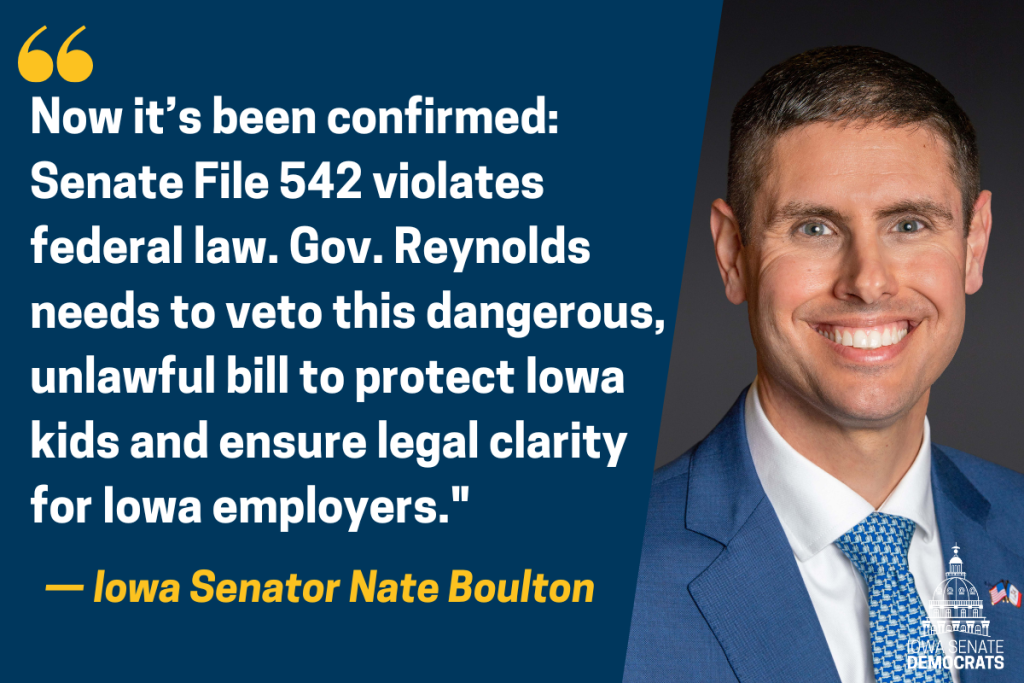Feds confirm: Child Labor Investigations Underway in Iowa

Several aspects of the child-labor expansion bill passed by Iowa Republican lawmakers this year explicitly violate federal labor law.
That’s the conclusion found in a letter sent this month from the U.S. Department of Labor to Iowa Democratic legislators, who had asked the department to review the legislation. The letter also confirms there are active child labor investigations underway in Iowa.
The child-labor expansion bill, Senate File 542, was passed by Republican politicians on May 3, but has not yet been signed into law by Gov. Kim Reynolds.
“This letter confirms what we’ve argued since this debate began: in the rush to expand child labor in Iowa, Republican legislators will be inviting businesses to break federal law,” Sen. Nate Boulton, D-Des Moines, said. “Protections against unsafe and exploitative child labor are there for a reason, and failed measures to address Iowa’s workforce crisis is no excuse to undermine those safeguards.”
“Now it’s been confirmed: SF 542 violates federal law. Gov. Reynolds needs to veto this dangerous, unlawful bill to protect Iowa kids and ensure legal clarity for Iowa employers,” Boulton said.
“With active child investigations underway in Iowa, now is not the time to put more kids at risk in dangerous working environments,” said Rep. Jeff Cooling, D- Cedar Rapids, Ranking Member of the House Labor & Workforce Committee. “Since this bill was pushed by out-of-state special interests, the Governor should do what’s best for Iowans and veto the bill. It’s bad for Iowa kids, parents, and local Iowa businesses who may get fined.”
The letter, signed by two top officials at the U.S. Department of Labor, finds that SF 542 “appears to be inconsistent with federal child labor law in several respects.”
It finds that:
- SF 542 allows 14- and 15-year-olds to perform non-incidental work in meat freezers – which is explicitly prohibited under federal law.
- SF 542 allows 14- and 15-year-olds to work in industrial laundries and “perform light assembly work” – both of which are likely prohibited under federal law.
- SF 542 expands the hours 14- and 15-year-olds may work to between 7 a.m. and 9 p.m. during the school year and between 7 a.m. and 11 p.m. over the summer. Federal law says they may only work between 7 a.m. and 7 p.m. during the school year and 7 a.m. to 9 p.m. over the summer.
- SF 542 expands the hours 14- and 15-year-olds can work to 6 hours on a school day and up to 28 hours a week during the school year. This also violates federal law, which limits work hours to 3 hours on a school day and no more than 18 hours per week during the school year.
The letter also confirms that the Department is actively investigating incidents of illegal child labor in Iowa.
“…the Department currently has over 600 child labor investigations underway nationwide, including in Iowa, and continues to field complaints and initiate investigations to protect children under the federal child labor laws,” the letter states.
The letter clarifies that “states cannot nullify federal requirements by enacting less protective standards” and pledges to keep a closer watch on child labor in Iowa: “The Department will continue to closely monitor the status of child labor laws in Iowa and their potential ramifications for federal child labor law enforcement.”
Dated May 10, 2023, the response came after an initial letter sent by seven Democratic lawmakers on March 14 seeking the Department of Labor’s opinion on the legality of the proposed legislation. While SF 542 was amended after the lawmakers’ initial request was sent, the conflicts to federal law identified by the Department of Labor remain in the final version of the legislation that passed on May 3.
###